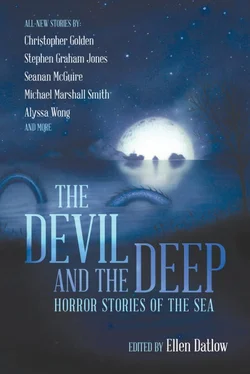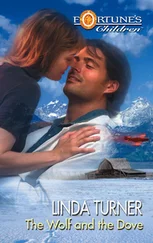“I was one of six witnesses. I didn’t want to talk about what happened, and the other five did. The media didn’t need me.”
“It’s a shame,” Barry said. “You could have banked a fortune if you’d have filmed the Emergence with your phone,” He sounded disappointed, yet smug, as if under the same circumstances he would have succeeded in making a bankable clip from the atrocity. “The only other video is garbage. The guy caught about three seconds of the monster before he started screaming and running off. Can’t see much of anything except the water swelling up and flooding the beach. Stupid fuck.”
“Yeah,” I said. “Stupid.”
We’d witnessed the emergence, or perhaps reemergence, of a life form that could produce spores containing a commutable virus, a virus that appeared to act as some kind of link between its monstrous source and the people it infected. Through this link, the creature could manipulate human behavior, summoning hordes of men and women to its waiting mouth. And this idiot could only think of photo opps and bank accounts.
And it occurred to me in that moment, that while I didn’t know exactly what Barry wanted, the man might not know either. The erratic path he’d taken through the conversation and the non-sequiturs suggested flailing and grasping, a struggle to remain in control. But he had no control here.
When he finally got to his point, it came as no surprise.
“We’re going to fight you on the will,” Barry said.
“I figured you would,” I replied. “You’ll be happy to know I don’t intend to fight back. Make a reasonable counter offer, something that shows even a modicum of respect for your father’s wishes, and I’ll sign off on it.”
“Really?” Barry asked. “Just like that?”
“Yes,” I said. “Your father and I had a lot in common, including the desire to have you and your mother out of our lives forever.”
After a bout of pointless outrage, Barry finally left. I said goodbye to George’s divorce shack and carried the suitcase and boxes to my car. Driving across town, my temper settled and the rage heating my face lessened. I’d never sold my house, though I hadn’t spent more than the occasional minute there since moving in with George. After the Emergence, I was grateful to have a place at the center of the island, away from the water. With the sound of Barry Caldwell’s voice still infecting my ears, I couldn’t wait to be back among my things.
I trudged to the door and inserted the key. The door opened onto gloom. Gray light and black shadows filled the room like heaped corpses reduced to char and ash. The shapes in the room made no sense. Tears smeared the chiaroscuro and I pressed back against the closed door, exhaling deeply as if the air in my lungs was the weight that held me back and not grief.
Reliving that night ruined me. Picturing George on the tongue of that unfathomable creature, blankly marching toward its gullet, played in a loop behind my eyes. The Benny Hill theme accompanied it, only the tune had been slowed to a moaning dirge, every beat in time with George’s footsteps, and those of the other fodder, crossing the beast’s tongue.
At the bedroom door, I wiped my eyes and took several deep breaths.
Some lies are told to protect the ones we love. Others are told to protect ourselves. The lie I’d told Barry Caldwell was both.
Pushing the door open, I forced a smile to my lips and stepped inside.
On the bed, George turned his head to me. He’d never reached the creature’s tongue the night of the Emergence. He’d walked to the beach. He’d struggled. Those things were true, but he’d never gotten away from me. I’d never have let him.
The leather cuffs at his wrists and ankles had held. His gag remained firmly in place. Eyes squinted against the meager, though unexpected light. Then they grew wide.
I sat on the edge of the bed and ran the back of my hand down the side of George’s cheek. Leaning over, I knocked my head lightly against his.
“They won’t come looking for you,” I said. “They’ll offer me a fraction of your estate when they contest the will, and I’ll take it.”
He squeezed his eyes closed and tears spilled down his cheek to pool against my thumbs. Gently, I removed the gag, and he sobbed softly.
“Thank you for this,” he said. “Can we go now?”
“The movers will meet us in Denver. Then we’ll go into the mountains. We’ll disappear.”
The deception had been his idea. In death, his family could no longer hope to control him. His family would get the bulk of his estate, and that’s the only closure they required. With all the disbelief and chaos surrounding the Emergence, and with no conflicting testimony from witnesses, the authorities had accepted my story with little more than a nod.
Now, we could disappear. We could build something new without the accumulation of his life littering our happiness. We’d decided to move far away from the Gulf, from all connected masses of water.
The Emergences were becoming more frequent, and those afflicted with Gibbet’s remained at risk. The victims still blacked out. They still wandered, requiring constant observation or restraint. They still danced.
“So, we’re okay?” George asked.
His hopeful eyes lost their life and turned hard. The grunting chant bubbled low in his throat, and I managed to get the gag in place before the violent syllables bellowed forth. I pulled away from him, but kept one hand on his cheek as he ranted into the muffling fabric.
“We’re okay,” I told him. “We’re just fine.”
THE CURIOUS ALLURE OF THE SEA
CHRISTOPHER GOLDEN
So stunning was the view from the deck of her new house that Jenny thought it might be worth the loneliness. Late afternoon sunlight made monstrous shadows of the pine trees on either side of the property, but straight back from the deck where the ground dropped away toward the rocks, she had the perfect vista—nothing but the indigo sweep of the Atlantic Ocean, the cold wind off the water, the white froth of the chop around the island, the circling gulls, and the occasional seal basking on the rocks. The romance of it plucked at her heart. She stood on the deck, tugged her thick wool sweater more tightly around her, and thought there might not be a more beautiful place on Earth. The house was hers. The deck was hers. But she couldn’t share it with anyone.
Not ever.
It started months earlier, on the rainy autumn morning when they found her father’s boat. Tom Leary had gone missing two days earlier after a lifetime at sea. Jenny had spent the time praying for him to radio in, praying the Coast Guard would find some trace of his fishing boat, the Black Rose . Praying for it, and dreading it as well.
Matt Finn knocked on her door at just past seven that morning. She opened the door of her rented cottage in pajama pants and a threadbare Patriots shirt, an arm placed self-consciously across her chest, eyes narrowed because she was too sleepy to open them all the way just yet. Officer Finn normally cut a fine figure in his uniform—Matt had been proud of his badge since his first day on the job, back when they’d still been dating—but that morning he just stood in the rain looking tired and sad, blues soaked almost black, and Jenny took one glance at him and knew.
He hesitated as he tried to muster up the words.
Jenny just shook her head. “I’ll get some clothes on and be right out.”
She shut the door and let him stand out there in the cold September rain. It never occurred to her until much later that she should have let him in. By then, she’d wish that she had. If she’d known how things would turn out, she’d have savored every moment of contact she could get. But wisdom always came too late.
Читать дальше













